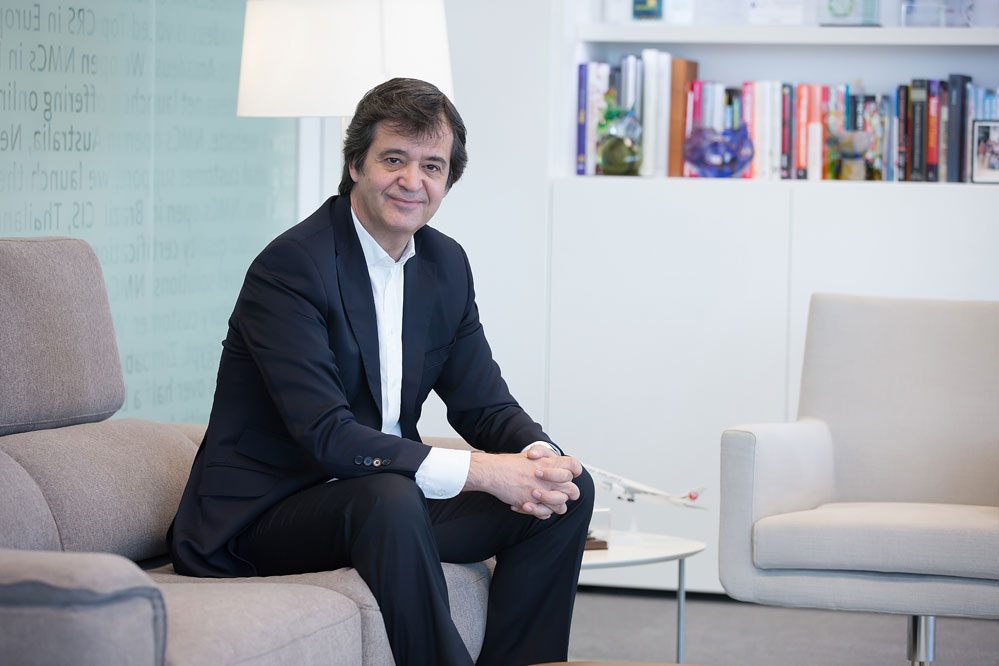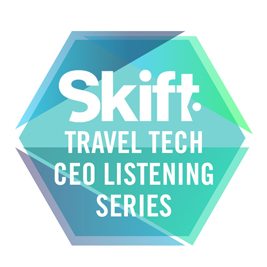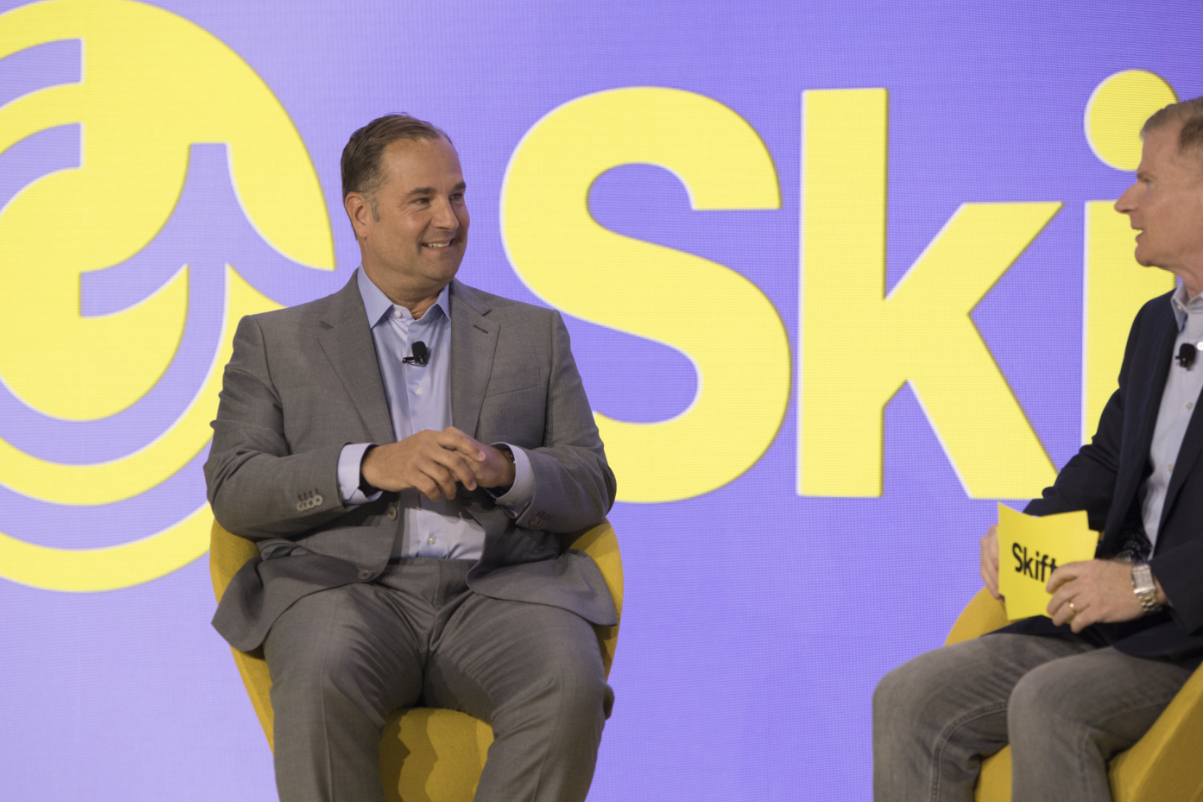Travel Tech CEO Series: Amadeus Is Evolving Despite Airline Distribution Pressures

Skift Take
Editor's Note: This year we expanded our coverage of the technology companies that do the behind-the-scenes work of powering the technology systems of the world's major travel companies.
We’re sitting down with a handful of industry leaders for our new Travel Tech CEO Listening Series to discover where they think the industry is heading.
Amadeus, the Madrid-based travel technology company, is a darling of the stock market.
The company has posted reliable earnings for many years, and investors have awarded it with a market capitalization of $24.5 billion, or 22.6 billion euro, with expectations of growth.
Amadeus has also been praised for its investment of more than $3.8 billion in research-and-development from 2004 to 2014.
But "long-term growth bet" and "R&D leader" are not the terms that airline executives usually use to describe Amadeus and its peer companies Travelport, Sabre, and TravelSky.
Those middlemen process at least half of all flights that agencies book worldwide.
Airlines like to say that these companies are a dead weight hanging around their necks. Executives accuse the companies of being complacent oligopolists who can't meet today's digital retailing needs.
Most of all, airlines resent the fees the middleman charge.
Last month, analysts at Credit Suisse published a 109-page report on Amadeus. The report praises Amadeus for its management and its pretax profit margin of about 25 percent, saying it is "plainly a high-quality company."
But the analysts see dangers. They predict that airlines will gain momentum in their move to get the middlemen, like Amadeus, out of their distribution chain.
The analysts acknowledged that Amadeus has been working hard to diversify into other lines of business, such as hotel enterprise software and airline IT systems.
But they fret that these businesses won't be able to grow fast enough to make up for expected losses when airlines like Lufthansa shift 10 to 20 percent of ticket volume into their own channels during the next several years.
Luis Maroto, chief executive of Amadeus, scoffs at such talk.
While not referring to any critics, in particular, he says these concerns aren't new and that their urgency has been blown out of proportion. Amadeus will manage the transition to new lines of business very nicely, thank you very much, he says.
The attempts to take companies like Amadeus out of the distribution chain sound like "a dramatic challenge" but the reality is less "significant," he says.
Maroto says two big stories symbolize Amadeus' momentum in 2017.
On May 8, Southwest Airlines switched its domestic business to Amadeus' reservation system in what appears to be a smooth transition. Southwest is Amadeus' first major airline customer in the U.S.
The success with Southwest may help it win deals and boost sales with other carriers.
Meanwhile, on hotel tech, this year also should bring a switchover for InterContinental Hotels Group to Amadeus's enterprise platform.
How important is this? Maroto says, "It is very important. IHG is admired in the industry. The moment we implement this reservation solution for IHG, it will represent a breakthrough. It will become our reference customer."
Maroto rarely talks to the media, but several weeks ago he spoke by phone with Skift. We've edited the interview for brevity.
Airline distribution
Skift: How is airline distribution changing?
Maroto: Distribution is becoming more complex because you have more travel products, more services for sale to travelers, more complexity in the way people are making their decisions, and more places for customers to buy services.
Airlines want to take maximum advantage of the new opportunities that the new channels are offering for contact with their customers.
Skift: How is Amadeus responding?
Maroto: We're trying to be more flexible. We are investing in providing airlines with cloud-based solutions, dynamic pricing through all the channels, and other functionalities.
Our focus is in working to optimize the right investments in technology. One example is that we are enhancing our capabilities to enable airlines to personalize the offers they make to their customers.
Then there is an important piece that has to do with our core technology platform, which lies underneath our products. We are in the process of moving to open systems as our backbone.
Skift: Can Amadeus successfully manage the shrinking of its distribution business in a profitable, stable way? A few investment analysts are wondering if the airlines' push for direct connections will prompt a sharp drop, rather than a slow decline.
Maroto: I do not expect a sharp drop in the GDS [global distribution system].
Of course, you have a dramatic challenge. You have direct sales. You have many different new ways today of selling tickets. Fine.
Yes, the reality is that the GDS has been growing less than passenger traffic has grown, and therefore, it is shrinking as a business.
The fact is that the GDS is growing less than the traffic is because there are other ways of selling tickets that have been growing faster.
But those trend lines have been happening for many, many years. We're not surprised. There will be alternative channels and, maybe alternative ways of selling.
But all of these things, like the "direct connects" that you mention, are not new. I mean, you know about how American Airlines, at one point in the U.S, tried to circumvent the GDS, in the mid-2000s.
Skift: Lufthansa has been creating direct connections with corporate travel agencies to avoid using companies like yours. There are rumors that other airline groups may try similar efforts.
Maroto: Is there going to be a general drop-off, like in the case of Lufthansa and the others, you ask?
With all due respect to the people that are representing those companies, I don't think these developments are as significant as has been represented.
The GDS provides substantial value to airlines. It aggregates content and provides this content to travel agencies. I don't see any other more efficient or better alternatives for that today.
Yes, the GDSs will need to evolve in functionality. But we have evolved before. Today we are much better at helping the airlines to really upsell and to really maximize their offer.
Skift: Many industries have gotten disrupted by the internet. Taxis by Uber etc. Retail by Amazon. Newspapers by Google AdWords. Are you sure Amadeus won't be disrupted?
Of course, there is always a risk that there is a disruption in any industry, as we have seen with the challenges the Internet has presented to many industries.
I cannot say nothing will happen that may impact our business in the coming years, that's clear.
However, what I may say is that nothing you mentioned is going to represent a sudden drop of whatever amount for our company.
Skift: Being a middleman distributor is not the future of your company, and you're not dependent on it, as a business, to thrive. So why not carve it out and sell it off?
Maroto: We aim to cover the whole travel industry. The GDS is an important part of how the industry works. On top of that, there are many synergies between what the GDS provides and other parts of our business.
It is true that the GDS has been growing less than the IT solutions and the investments we have grown in other areas such as hospitality. But it will remain an important part of the company in the future.
Aviation IT
Skift: In 2015, Amadeus made its biggest acquisition yet under your watch. It acquired Navitaire, which specializes in reservation systems, for $830 million. Luis, how does the acquisition fit into Amadeus' long-term vision?
Maroto: Navitaire had the largest market share as a tech provider to the low-cost carriers. We hadn't had as much traction in that segment.
So the deal has given us a position in a segment that is relevant, important, and growing.
It also allows us also to provide an overall solution to airline groups that own both low-cost carriers and full-service carriers.
Skift: So there are synergies between Navitaire and Amadeus's Altêa suite of software?
Maroto: There are some commonalities of the products that low-cost carriers and full-service carriers need — the reservation, inventory, and departure control pieces.
I mean, imagine a low-cost carrier. It is growing and begins to need some functionalities that Amadeus has already on the departure control or revenue management.
It could be the other way around. Navitaire used to develop things from the e-commerce front, on the merchandising space for low-cost carriers that we could use for network carriers who are our Altéa customers.
Skift: Another arm of Amadeus is its IT solutions for airlines. This segment has attractive economies of scale. But how should we judge the success of the business? Because the "revenue per passengers boarded" number doesn't seem to be growing fast. What's the relevant metric?
Maroto: So, the most important metric is revenues. Our revenue has recently been growing about 30 percent, year-over-year. Our goal is to continue growing this unit at a double-digit pace in the years to come.
But behind that, there are other metrics, such as the number of customers, the growth in volumes we do with those customers, and the number of selling functionalities that we provide.
Achieving growth depends on enhancing our systems. We must also continue to add functionalities for upselling on top of our Altéa reservation system.
And then, due to these upselling activities, the airlines and Amadeus will get more revenues per passenger in the end.
Skift: Airlines seem to be in a land grab for data ownership with companies like Amadeus. Airlines increasingly believe that owning the data generated by ticket sales is crucial to their future. How does Amadeus handle this balance between satisfying their airline customers and the larger issue, the fight over data ownership?
Maroto: Well, it is true there are a lot of debates about that data ownership. Even legally there is a lot of evolution in the regulation of it.
We have invested in technology we call "travel intelligence" internally. We help customers make use of data, whether those customers are travel agencies, travel providers, airports, or hotels. We use data to help them optimize their sales and manage costs.
For example, when you need to monitor plane disruptions, such as cancellations and rebookings, this has been possible thanks to the information on passengers that we may have with our solutions.
So it's a combination of three things: getting insight from the data that we have, providing this insight to our customers, and explaining to our customers in a way that's intuitive how to best take advantage of this insight.
Skift: What are you doing to change the underlying architecture to better upsell and cross-sell? On the technical side to achieve this, the industry has talked about creating a more useful Passenger Name Record (PNR), the identifier that acts like the magnet attracting relevant information through the booking and distribution processes. The industry wants to be able to associate more information about the customer around the PNR.
Maroto: Well, Amadeus Total Travel Record, a product which we are developing, is a kind of "super PNR" and is fully aligned with this logic.
It follows that we have developed consolidated travel information across different travel categories and from many different sources.
So, as you know, trips are, generally, multi-modal and involve many different services via transport. Many corporate travel agencies still require travel intermediaries to manage this holistically on their behalf.
As trip complexity is increasing, our technology will need to evolve, to take into account the new requirements and to provide this ability to the customers. We are keen on supporting this evolution.
Expanding in hospitality tech
Skift: What is your vision for the company's hospitality business?
Maroto: Our vision with hospitality is to repeat the success we have had with aviation. We estimate that hotel distribution and hospitality technology represent a market that, together, is worth close to $5 billion.
Hospitality technology has been a very fragmented sector, between traditional IT companies, small specialist technology providers, and in-house development.
Our vision is to bring all the technology a hotel needs to operate together in a modular, component-based platform, so hoteliers have an integrated view and no need to use interfaces between the different components.
Our acquisition of Newmarket, a hotel technology provider, has gone well. We've complemented our portfolio by enlarging the capabilities of our property management system, which has grown out of our 2015 acquisition of Itesso in the Netherlands, and integrating the whole solution with our sales tools.
Skift: Looking at the competition, some big players have first-mover advantage. Oracle has bought Micros, the legacy leader. Sabre has more than 30,000 properties on SynXis. And so forth. Is Amadeus coming too late to the game?
Maroto: Yes, there's competition. There are also the in-house reservation systems at many of the global chains.
But, I mean, in any industry you have legacy players, and the only thing we can do is try to be better and beat the competitors. There is no more secret to it than that.
We also had legacy players when we enter into airline reservation system with our Altéa product.
Yes, Micros is a strong company backed by Oracle. Sabre is another strong company.
But there is no one providing an integrated and complete solution with the different elements that I mentioned we have. Of course, we need to prove it. But I believe we will succeed.
Skift: Is there anything that you feel is missing from your suite of solutions for hospitality?
Maroto: No, not a big one. You can always find more functionalities that could complement our offer. But the main parts of the portfolio are the ones I've mentioned.
Mainly when we go shopping for businesses, we are looking for functionality, customer base, and market share and market potential, given the pace of growth.
We have the majority of our portfolio assembled. But still, the main customers that we have added lately have come from the acquisition of Newmarket.
So there could be acquisitions, yes, but it's not in this case so much related to specific functionalities that we don't have today. Could be about companies that can add customers.
That could always be a possibility, at the right price, of course, and with the right value creation for Amadeus.
Skift: So, one finance question: When you first started as CEO, Amadeus had a high debt load. How should we think about the debt load at Amadeus today?
Maroto: We have communicated we are not planning to go back to very high levels of debt unless this is justified by the acquisition of a company.
We believe we can say within our current range. As you know, we are a company that can raise a good amount of cash.
Managing growth
Skift: Historically, Amadeus has not had large market share in North America. Will that change?
Maroto: Well, I believe we have done a lot in North America. Southwest's migration onto our reservation system has, of course, been extremely important for us, because, of its large passenger volumes.
We have also been quite solid on the distribution side with agreements and working with brands such as Expedia and Kayak.
We provide services to some of other North American carriers. As you know, Air Canada is using our commerce solution. United is using our shopping tool. We also do work with airlines such as Freedom and Sun Country.
We also have our hospitality business. Combined, today Amadeus has about 2,000 employees in the North American region and 11 offices across the US and Canada.
Our presence in North America has grown quite a lot recently. Our customer portfolio has been increasing and, hopefully, this will continue.
Skift: Your company has become enormous, with more than 15,000 employees. What are you doing to stay lean and competitive instead of slow and bureaucratic?
Maroto:: Look, I'm not saying we are a perfect company, but we are not so big. I mean we are big, yes, but we're still manageable in employees.
Yes, there is always a risk that we grow to become more bureaucratic.
To avoid complacency, the only thing you can do is to focus on listening to the customer. You need to cultivate a mentality where change is embraced because we know the market is changing all of the time.
I mean, speed is a must for any company. We need to be faster than we are, but this is not because singularly we are slow.
We need to be faster every day because customers are expecting very fast solutions to their needs and are not ready to wait.
We can be better as a company, yes. But our success is not coming by luck, and I believe that we have done some good things. And that's by having a continuous focus on taking the customer as the reference point in all decisions.
Skift: Amadeus marks it's 30th birthday this year. As its CEO since 2011, what strikes you as most impressive about the company?
Maroto: We have remained quite an optimistic company in how we look into the world.
We've become more global, which is never easy for any business.
We continue to demonstrate a capability to diversify in new domains, always a challenge.
Taken together, that is the company culture I inherited. That is the one I want to pass on as my legacy.
Check out other articles in Skift's Travel Tech CEO Series.






